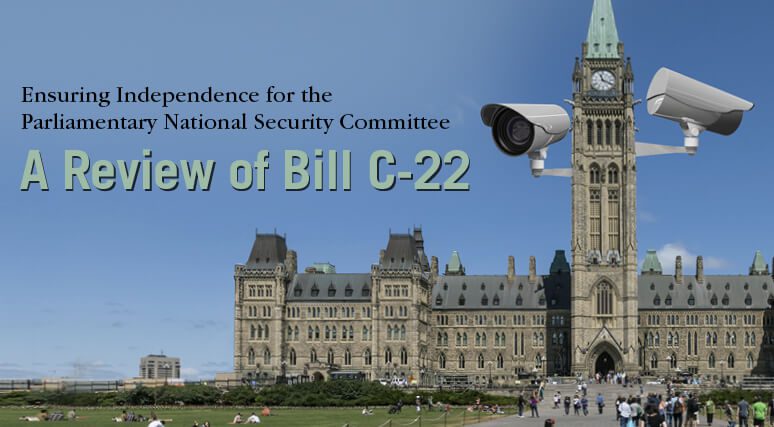Noted national security expert Scott Newark recommends changes to Bill C-22 to create an independent and authoritative review committee that holds the executive branch to account
OTTAWA, Nov. 10, 2016 – Ottawa should be applauded for implementing a system of Parliamentary review of the government’s national security policies, but the new legislation will need tweaks to ensure that the Prime Minister doesn’t have too much power over the process.
That’s the message from Scott Newark in a new Macdonald-Laurier Institute paper that critiques Bill C-22. The proposed law would create a new Parliamentary committee of MPs and Senators that will review the activities of security agencies and offer recommendations for how to improve the government’s approach to national security.
But without changes to the legislation, Newark says, the proposed committee risks being overly dependent on the control of the Prime Minister’s Office and cabinet ministers.
“The independence and authority of the Committee is critical if it is to deliver on its promised role”, writes Newark.
To read the full paper, titled “Ensuring Independence for the Parliamentary National Security Review Committee: A Review of Bill C-22“, click here.
The proposed Committee is expressly defined as not being subject to the regular committee procedures like power of appointment, election of chairs, scheduling meetings and filing of reports. Contrary to regular committee practices, the executive branch of government (PM and Ministers) has significantly heightened control including the power to authorize investigations or provide information, all expressly without challenge or appeal.
“The independence and authority of the Committee is critical if it is to deliver on its promised role” -Scott Newark
The PM appoints the Committee Chair, which is unprecedented. As the Committee would only meet at the chair’s direction, the Prime Minister’s hand-picked chair would wield significant power.
Further, Committee reports would be provided to the PM for screening before being filed in Parliament and while the Committee can conduct special reviews and provide reports to the PM, they are not provided to Parliament.
Why is effective review so important?
It offers an “after-the-fact” examination of large policy issues, such as the massive national security legislation, Bill C-51, and information sharing between various national defence agencies (such as CSIS and the RCMP).
It also derives possible “lessons learned” on specific operations. For example a specially authorized parliamentary committee could review how Ali Mohamed Dirie, a terrorist convicted of attempting to attack targets in Toronto and the area, was able to fly out of Canada to Syria following his release from prison.
But, Newark writes, work needs to be done if Bill C-22 “is to live up to the government’s stated commitment to parliamentary independence”.
Newark offers several recommendations for improving the process, including:
- Clarify the number of Committee members to be appointed including that two are to be from the Senate and three from House Opposition parties (two from Official Opposition) as the text currently suggests that the Committee might have less than the maximum number of nine members
- Authorize the Committee to elect its own chair by secret ballot, removing the power of the Prime Minister’s Office to appoint the chair and thus have undue influence over the Committee’s activities;
- Authorize the Committee to set its own meeting schedule by existing Committee procedures rather than solely on the direction of the chair;
- Clarify that the Committee may receive and consider information provided by the public
- Authorize the Committee to indicate in its Report to Parliament that it was denied information by a Minister or that its Report has been edited by the Prime Minister[DW2] , shedding light on potential efforts by the Executive to curtail its effectiveness;
- Authorize the Committee to require the Minister to appear before the Committee for in camera questioning when information has been withheld from the Committee;
- Authorize the Committee to initiate an examination of an issue and, subject to the process in C-22, to provide that to the PM and, on approval to Parliament;
- In considering Bill C-22, Parliamentary Committees should examine why Committee internal procedures are subject to Governor in Council regulation, the intended functions of the Secretariat, and how the secretariat will be independent from the executive branch of government.
- Consider including in C-22 the offence of willfully misleading, obstructing or knowingly providing false or inaccurate information to the Committee without lawful justification for doing so.
***
Scott Newark is a former security and policy advisor to both the Ontario and federal Ministers of Public Safety. During a 30-year criminal justice career, he has also served as an Alberta Crown Prosecutor, Executive Officer of the Canadian Police Association, Vice Chair and Special Counsel for the Ontario Office for Victims of Crime and Director of Operations for the Washington D.C. based Investigative Project on Terrorism.
The Macdonald-Laurier Institute is the only non-partisan, independent national public policy think tank in Ottawa focusing on the full range of issues that fall under the jurisdiction of the federal government.
For more information, please contact Mark Brownlee, communications manager, at 613-482-8327 x105 or email at mark.brownlee@macdonaldlaurier.ca.





